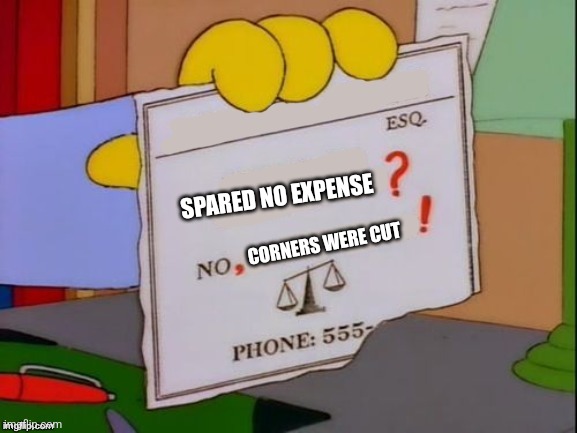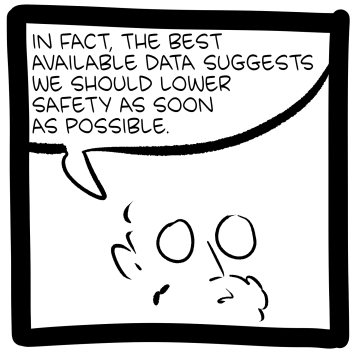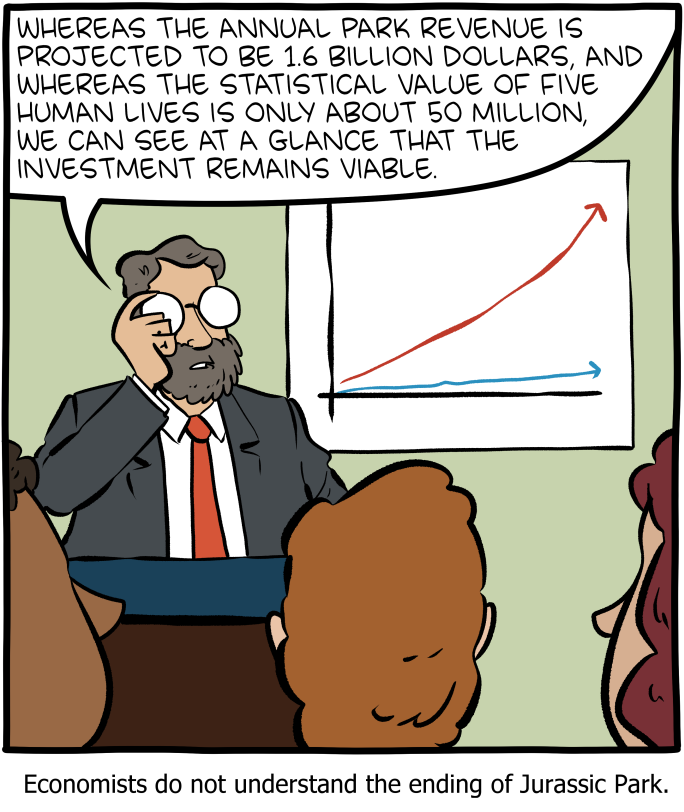Economics really sucks at accounting for the value of human life. I remember there was a study on the financial impacts that smokers have on society. The idea going in was that smokers would get health issues which would cause a financial drain on societies which pay for people's healthcare. The study actually found that smokers weren't a drain at all. Smokers tended to die quickly, meaning no chronic health treatments. More importantly, they died young. Meaning they didn't cash in their government pensions. Governments were essentially profiting off smokers. The study did another analysis, this time putting in a fake number for the "value of life" and the result was as expected. Smoking is a negative because it kills people.
Comic Strips
Comic Strips is a community for those who love comic stories.
The rules are simple:
- The post can be a single image, an image gallery, or a link to a specific comic hosted on another site (the author's website, for instance).
- The comic must be a complete story.
- If it is an external link, it must be to a specific story, not to the root of the site.
- You may post comics from others or your own.
- If you are posting a comic of your own, a maximum of one per week is allowed (I know, your comics are great, but this rule helps avoid spam).
- The comic can be in any language, but if it's not in English, OP must include an English translation in the post's 'body' field (note: you don't need to select a specific language when posting a comic).
- Politeness.
- Adult content is not allowed. This community aims to be fun for people of all ages.
Web of links
- [email protected]: "I use Arch btw"
- [email protected]: memes (you don't say!)
you may be thinking about this study: https://en.wikipedia.org/wiki/Public_Finance_Balance_of_Smoking_in_the_Czech_Republic
there is also famous ford pinto scandal, where ford pinto would sometime catch fire during relatively small rear-end collisions, ford knew about the problem, the change in design would cost $15.30 per car, yet ford decided it is cheaper to let few people die and deal with the consequences.
Economics is a tool, and yes of course you can get different conclusions based on different assumptions. Doesn't mean economics is bad, just means it is being used in different ways and for different purposes. Same with statistics. assumpsions are important.
The economy is a fake religion we made up to explain the psychology of mass amounts of peoples spending habits. Then we put everybody's money into 401ks bcz it was cheaper than pensions, and told them if the economy does bad they don't get to retire.
I like the fan theory that jurassic park could have worked if they followed modern guidelines for zoos in terms of meeting the minimum enclosure sizes per animal and making sure that the animals were properly stimulated. But John Hammond just cut every corner he could.
B-b-but he said he spared no expense!

He didn't, it's just that the expense was spent on dodging regulatory obligations as opposed to actually making a park that wouldn't be more at home in an analogue horror series
Sure. Trying to run a highly dangerous, technologically advanced theme park with two underpaid IT guys and no disaster avoidance and recovery plans.
Recovery plan: Australian guy with a shotgun.
You know it's true in universe because otherwise JW would have never happened,
At least you could argue 2 and 3 were just consequences of the first attempt, but World was just straight up the economists ignoring all the glaring red signs warning the need to do a shitton more research before trying it again.
And yeah they absolutely did ignore zoological guidelines, separating baby animals from their parents to be used as glorified springy horsies for toddlers would never be allowed at even most mismanaged zoos.
The fact that the two biggest carnivores in the park have direct access to the main park area even if only through an airlock series of doorways is just the worst planning imaginable.
Think how willing you'd be to go to a zoo if you knew the polar bear and mountain lion (two carnivores known to hunt humans) enclosures had access hallways with entryways directly from the park center?
You'd be wondering if the nearby sunscreen for sale was actually food dyed barbeque sauce for efficient euthanasia of anyone dumb enough to still be going!
Well, yeah, that's half of the point of the book. That the movie tried to preserve, but it would take screen time away from dinosaurs attacking people.
(What was the right choice if you ask me.)
Can hardly expect revenues to stay the same after it gets out that safety is that insufficient though, surely an actual economist would have a way to take that into account?
Include the cost of a PR firm?
Hehehe, now to write a giant wall-of-text no one will read >:)
Capitalism co-opts and usurps all other value systems in society. It takes those values, reduces them to money, repackages them, and re-sells them as a market that can be cornered.
From hippie shops, to far-left news, or YouTube monetizing the popularity of the latest anti-capitalist sentiments.
This idea that Capitalism creates an inescapable system, which then makes culture one of it's tools and creates inescapable outlooks/mindsets/cultures is written about in Frankfurt School theorist Herbert Marcuse' book; 'One-Dimensional Man' (yes there are summary explanations of the book/theory available on YouTube).
There's surely some room for escape? One possibility might be the popularization and adoption of Modern Monetary Theory (MMT), which essentially states that a sovereign currency only puts its self in an inflationary competition with private industry if it's competing with private industry for resources.
So for instance there's no private industry focused on providing for the homeless, so you can (in Modern Monetary Theory's perspective) give money too homeless people without an increase to inflationary pressures (private interests and capitalists aren't seeking to do this, because there's no competive market in doing this so the government wouldn't be causing a price inflation bidding war with them by doing it). As an example for what you can't do - you can't (as a government using MMT) outbid construction companies for Timber in order to build houses (because outbidding private construction companies will push the price of Timber up causing inflation).
So it's ONLY stuff there's a limit of raw materials on, where the government could use it's infinite supply of money to outbid private industry that would cause price inflation. That's where the government can't just spend willy nilly.
This knowledge makes it clearer what government can put massive amounts of funding into - without harming the economy or causing hyper inflation, and what it can't. It definites the safest areas to spend in without any real risk of causing hyperinflation.
This means you could pay homeless people a UBI - and MMT states it won't cause inflation. By making this distinction (between price inflationary pressure and non-inflationary pressure) MMT helps make clearer what the government can pour direct aid on, vs what will be a matter of creating an outbidding competition with private interests (eg.something that causes price inflation).
Modern Monetary Theory (MMT) is based on historical studies and examples of how money has actually been used and functioned in past societies and situations. It makes clear there are lots of places that with proper regulation and oversight the government could fund massive improvements in without price inflation or damaging the economy.
Public transport might be another example, it'd be fairly safe to have a government funded monopoly on public transport as it's unlikely to compete with private industry for resources in a price-inflationary raw resource based manner.
Public transport might be another example, it'd be fairly safe to have a government funded monopoly on public transport as it's unlikely to compete with private industry for resources in a price-inflationary raw resource based manner.
That would be so nice, too.

